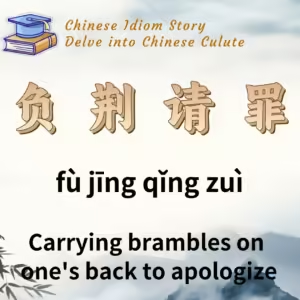
Chinese Idiom: 徒有四壁 (Tu You Si Bi)
English Translation: Only Four Walls
pīn yīn: tú yǒu sì bì
Idiom Meaning: This idiom describes a state of extreme poverty, where a household possesses nothing but its walls. The term “徒” means “only” or “merely,” while “壁” refers to “walls.”
Historical Source: The phrase originates from Records of the Grand Historian (《史记·司马相如列传》)
Idiom Story:
The story revolves around Sima Xiangru, a famous writer and poet from the Western Han Dynasty. He was born in Chengdu, Sichuan, and showed a passion for literature and martial arts from a young age. During the reign of Emperor Jing, he served as a cavalry attendant but struggled to achieve recognition and eventually resigned due to illness.
After his resignation, he visited the state of Liang, where he became friends with the local nobility, including the wealthy Marquis of Liang. Following the death of the Marquis, Sima returned to Chengdu, but soon, the local magistrate, Wang Ji, invited him to the county of Linqiong. In Linqiong, he was highly regarded by the wealthy landlords, particularly by Zhuo Wangsun.
One day, Zhuo Wangsun invited Sima Xiangru to a banquet, which led to the famous tale of “Wenjun’s Night Escape” (文君夜奔). The Records of the Grand Historian recounts how wealthy families in Linqiong were plentiful, with Zhuo Wangsun having hundreds of servants. On the day of the banquet, Sima Xiangru initially declined the invitation due to illness, but the magistrate personally went to fetch him. Sima Xiangru felt compelled to attend, despite feeling out of place among the wealthy guests.
During the banquet, the magistrate presented him with a qin (a traditional string instrument), hoping he would entertain the guests. Sima, wishing to impress Zhuo Wangsun’s daughter, Zhuo Wenjun, who had recently lost her husband and loved music, played beautifully. Zhuo Wenjun, enamored by Sima’s talent, secretly observed him from the door.
After the banquet, Sima Xiangru sent gifts to Zhuo Wenjun through her maid, expressing his admiration. That night, Zhuo Wenjun eloped with Sima, and upon their return to Chengdu, they found themselves living in abject poverty, with “only four walls” to their name.
Over time, Zhuo Wenjun grew dissatisfied with their impoverished lifestyle. Together, they decided to sell their horses and carriages to open a wine shop, which eventually brought them prosperity. Sima Xiangru became renowned for his literary works, and Zhuo Wenjun received support from her father, leading to their successful future.
The idiom “徒有四壁” serves as a poignant reminder of the hardships of poverty, illustrating how one’s initial circumstances can change through determination and love. It reflects not only the struggles of Sima Xiangru and Zhuo Wenjun but also the resilience of those who strive to improve their situation.






